The Samsung 860 QVO (1TB, 4TB) SSD Review: First Consumer SATA QLC
by Billy Tallis on November 27, 2018 11:20 AM ESTAnandTech Storage Bench - Heavy
Our Heavy storage benchmark is proportionally more write-heavy than The Destroyer, but much shorter overall. The total writes in the Heavy test aren't enough to fill the drive, so performance never drops down to steady state. This test is far more representative of a power user's day to day usage, and is heavily influenced by the drive's peak performance. The Heavy workload test details can be found here. This test is run twice, once on a freshly erased drive and once after filling the drive with sequential writes.
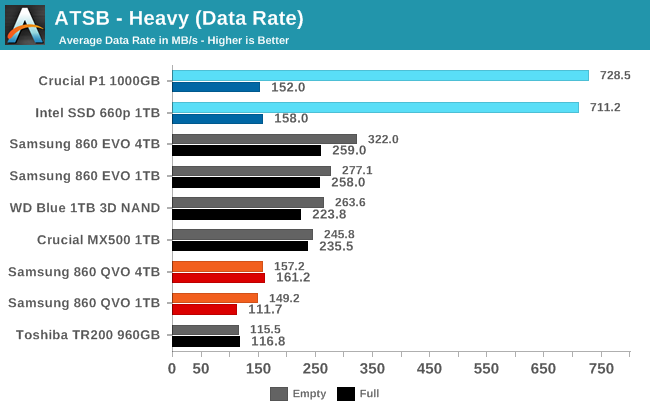
Neither capacity of the Samsung 860 QVO can keep pace with the mainstream TLC drives on the write-intensive Heavy test, but they both outperform the DRAMless TLC drive. The NVMe+QLC drives from Intel and Micron fare much better when the test is run on an empty drive, but when full they too fall behind the mainstream TLC SSDs.
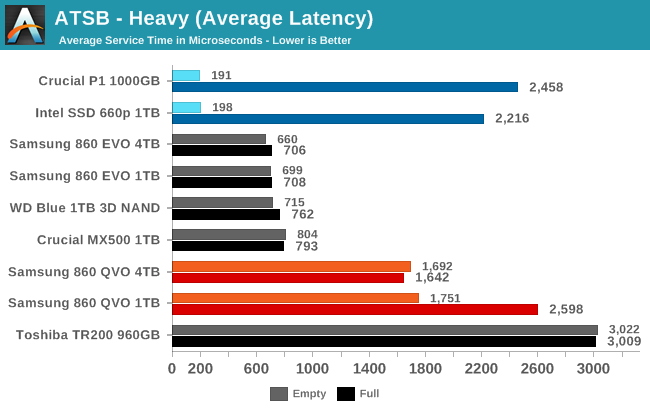
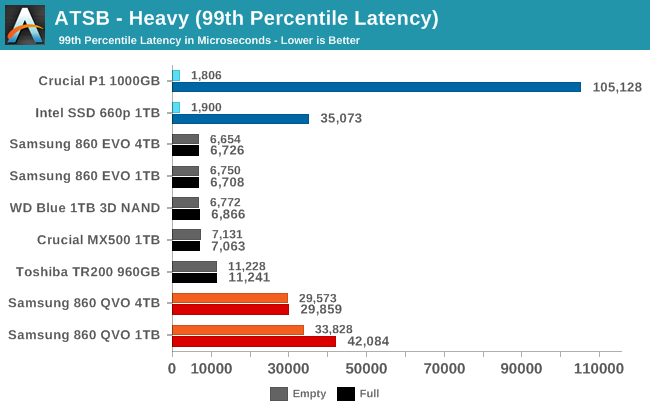
The Samsung 860 QVOs have much worse latency scores than the mainstream TLC drives, and the 99th percentile latency is much worse than even the DRAMless TLC SSD. However, the Samsung QLC drives are a bit better than the Intel/Micron QLC drives at keeping latency under control when the test is run on a full drive.
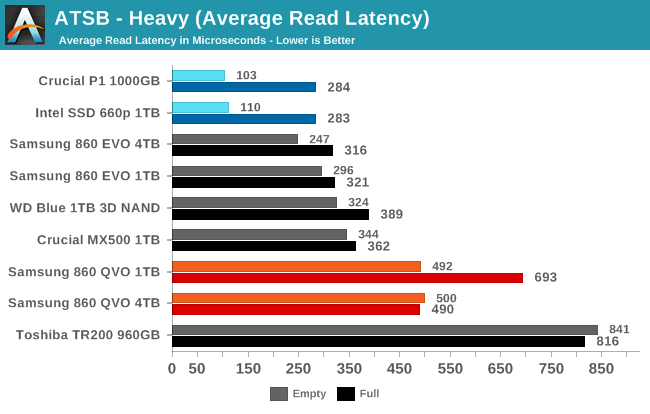
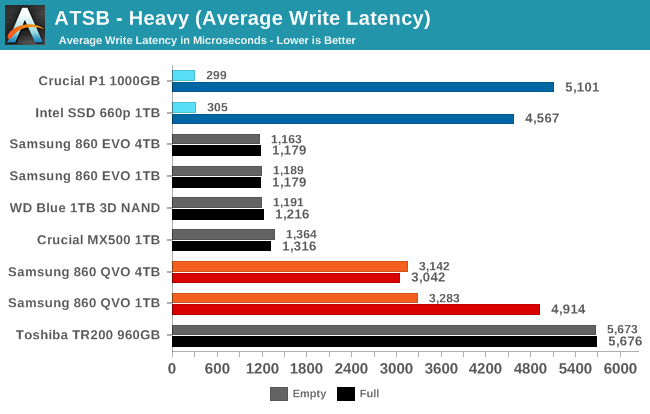
The average read latencies from the Samsung 860 QVOs are only a bit higher than the mainstream TLC drives, but the average write latencies stand out as worse by at least a factor of two.
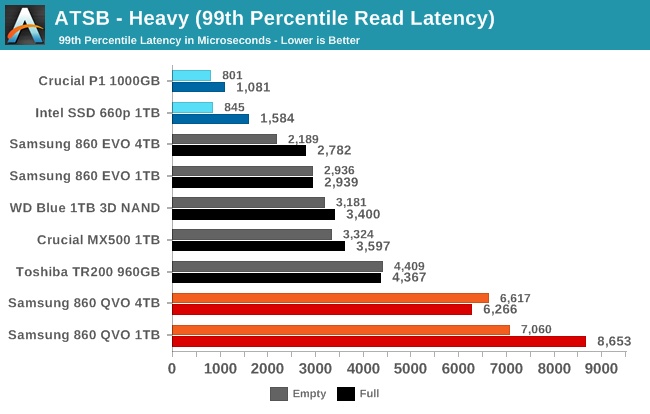
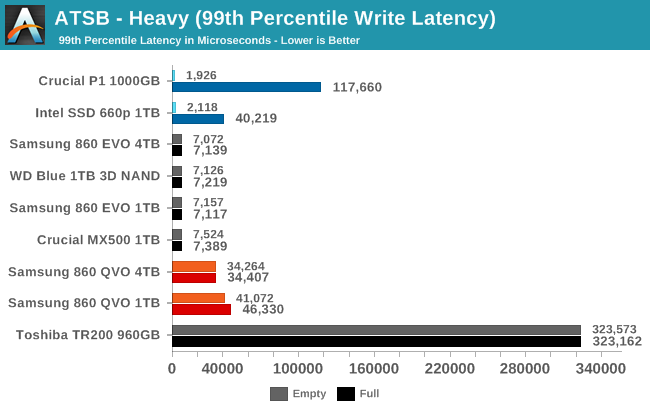
The 99th percentile read and write latency scores from the 860 QVOs are poor, but they at least avoid the horrific write QoS issues that the Toshiba TR200 shows, and are better than the full-drive run on the Crucial P1.
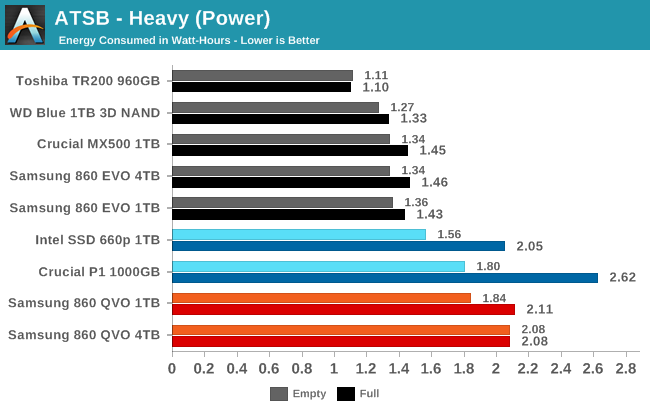
The Samsung 860 QVO uses substantially more energy over the course of the Heavy test than the other SATA drives, and more than the the NVMe QLC drives in most cases, too.










109 Comments
View All Comments
stanleyipkiss - Tuesday, November 27, 2018 - link
Sell me a 8 TB QLC SSD for $400 and I'll bite. That's what QLC is for: moving off of spinning rust and onto SSDs with my bulk storage. Until then, this is useless without MASSIVE price drops. They are trying to milk saps who can't tell the difference between SSDs (i.e. normal consumers) by not dropping prices... yet.The race to the bottom for SSDs is coming. The manufacturers are just greedy enough not to want it to happen too soon.
But give me an 8TB or bigger SSD for $400 and I'll be the first to buy it. I'll even buy two!
R0H1T - Tuesday, November 27, 2018 - link
Yeah no one's selling you 8TB for $400 anytime soon. Aside from the fact that the R&D costs for QLC need to be recuperated first & companies need to reinvest an increasing amount for future development, there's also a point after which it doesn't make sense for the SSD, or NAND, maker to sell these at a loss.If you really want something that big, for dirt cheap, try spinners instead.
shabby - Tuesday, November 27, 2018 - link
How will they recoup the price when no one is going to buy this? The evo 860 is cheaper.R0H1T - Tuesday, November 27, 2018 - link
So you think the 860 QVO will stay at 15c/GB for the rest of it's time on the market or have you not seen high prices at launch, for any other product before this?shabby - Tuesday, November 27, 2018 - link
Obviously no, but why launch it at this price from the start. Should of launched it at $99 for 1tb that would probably get it some fanfare.R0H1T - Tuesday, November 27, 2018 - link
Early adopter tax? Samsung is usually the first to launch "one of a kind" products in the retail market & they get the ball rolling for many of the innovations in this industry. The prices would come down sooner if the competitors launch their SATA QLC drives quickly.shabby - Tuesday, November 27, 2018 - link
I doubt anyone will be rushing to the store to buy these.Ironchef3500 - Wednesday, November 28, 2018 - link
+1Jad77 - Wednesday, November 28, 2018 - link
"I doubt anyone will be rushing to the store to buy these."That is the perfect one-line review!
moozooh - Tuesday, November 27, 2018 - link
Yeah, the problem here is that the QVO is not a "one of a kind product"—in every possible aspect and scenario it's either the same as the EVO or worse, sometimes very substantially so, without being substantially cheaper. Right now there is exactly zero reason to choose it over the EVO. In order to compete with it favorably the QVO needs to be at least 25% cheaper to offset the disadvantages. In other words, under 11 c/GB. Until then nobody would be willing to give this inferior product the time of the day.